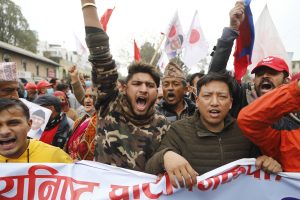In 2017, the Nepal Communist Party (NCP) won nearly two-thirds of seats in Parliament after promising voters “development and prosperity.” Supporters welcomed the new majority government as a chance for progress through stability, after dozens of short-lived coalition governments since the 1990s. Yet today, three and a half years later, the NCP is split in two due to personal – not policy – disputes among top leaders, the future of Prime Minster Khadga Prasad Oli’s government is uncertain, and promises of miraculous economic growth are in tatters.
“I was hopeful that there would be five years of political stability and development,” says Santosh Bhujel a 33-year-old former Maoist child soldier in Nepal’s civil war and now a pig farmer. “Nepali politics is disgusting. I feel betrayed.”
Twenty different governments have ruled Nepal since 2000, the highest turnover rate in all of South Asia. While the immediate cause of the current crisis was an intra-party feud, a variety of factors underlie Nepal’s recurring pattern of instability. Some Nepalis blame weak democratic institutions, while others cite corruption and the exclusion of historically marginalized ethnic groups, so-called low castes, and women. India has interfered in Nepal’s domestic politics in the past, but this time there is little evidence it had a hand in the NCP’s split.
Historically, changes in government rarely vanquish any leader for long. Indeed, the same faces from a handful of political parties reappear decade after decade in novel coalitions. In this sense, Kathmandu politics resembles not so much a war zone as a game of musical chairs, or as Bikram Shakya, the owner of a wholesale kitchen-goods store, puts it, “a leg-pulling game.”
“Whoever is in power just tries to stay in their seat, while those out of power try to get into power by pulling down their opponent,” says Shakya. “Meanwhile, no one cares about fulfilling their duties.”













